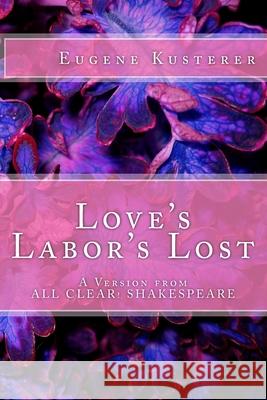Love's Labor's Lost: A Version from ALL CLEAR! SHAKESPEARE » książka
Love's Labor's Lost: A Version from ALL CLEAR! SHAKESPEARE
ISBN-13: 9781505635843 / Angielski / Miękka / 2015 / 118 str.
To capture the essence of this play, many commentators quote from the play itself: "They have been at a great feast of languages..." The plot - such as it is - is constructed around one decision. The King has decided to establish a monastic-like school. Students, staff and palace workman will all be subject to the monastic rules. The rule that proves the most unworkable is one that bars all interchange with women. On a political mission representing the moribund King of France, the Princess arrives, with three courtly ladies as her traveling companions. As Berowne, one of the lordly students, observes, "Young blood doth not obey an old decree. We cannot cross the cause why we were born." And there's your plot If that's the jewel, the setting is the "feast of languages." The middle to late 1500's in England was the time when the English language was just emerging from a state of being considered a barbaric, backward language. It burst from its cacoon and the celebration was on Shakespeare satirizes the excess of such celebration -- and pretty much goes to excess in so doing If you don't delight in all manner of wordplay, this may not be the play for you. Go see Branaugh's movie version - quite streamlined, with any number of Cole Porter(?) songs interjected. It's a blast -- but not the Bard's play
Zawartość książki może nie spełniać oczekiwań – reklamacje nie obejmują treści, która mogła nie być redakcyjnie ani merytorycznie opracowana.











